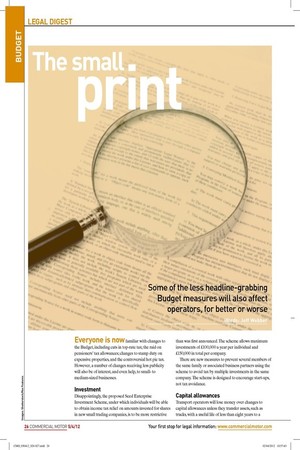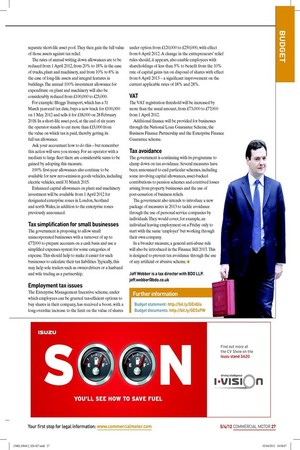The small
Page 19

Page 20

If you've noticed an error in this article please click here to report it so we can fix it.
prin
LEGAL DIGEST
Some of the less headline-grabbing Budget measures will also affect operators, for better or worse
Words: Jeff Webber Everyone is now familiar with changes to the Budget, including cuts in top-rate tax; the raid on pensioners’ tax allowances; changes to stamp duty on expensive properties, and the controversial hot pie tax. However, a number of changes receiving less publicity will also be of interest, and even help, to smallto medium-sized businesses.
Investment
Disappointingly, the proposed Seed Enterprise Investment Scheme, under which individuals will be able to obtain income tax relief on amounts invested for shares in new small trading companies, is to be more restrictive than was irst announced. The scheme allows maximum investments of £100,000 a year per individual and £150,000 in total per company.
There are new measures to prevent several members of the same family or associated business partners using the scheme to avoid tax by multiple investments in the same company. The scheme is designed to encourage start-ups, not tax avoidance.
Capital allowances
Transport operators will lose money over changes to capital allowances unless they transfer assets, such as trucks, with a useful life of less than eight years to a separate short-life asset pool. They then gain the full value of those assets against tax relief.
The rates of annual writing down allowances are to be reduced from 1 April 2012, from 20% to 18% in the case of trucks, plant and machinery, and from 10% to 8% in the case of long-life assets and integral features in buildings. The annual 100% investment allowance for expenditure on plant and machinery will also be considerably reduced from £100,000 to £25,000.
For example: Bloggs Transport, which has a 31 March year-end tax date, buys a new truck for £100,000 on 1 May 2012 and sells it for £18,000 on 28 February 2018. In a short-life asset pool, at the end of six years the operator stands to cut more than £15,000 from the value on which tax is paid, thereby getting its full tax allowance.
Ask your accountant how to do this – but remember this action will save you money. For an operator with a medium to large leet there are considerable sums to be gained by adopting this measure.
100% irst-year allowances also continue to be available for new zero-emission goods vehicles, including electric vehicles, until 31 March 2015.
Enhanced capital allowances on plant and machinery investment will be available from 1 April 2012 for designated enterprise zones in London, Scotland and north Wales, in addition to the enterprise zones previously announced.
Tax simplification for small businesses
The government is proposing to allow small unincorporated businesses with a turnover of up to £77,000 to prepare accounts on a cash basis and use a simpliied expenses system for some categories of expense. This should help to make it easier for such businesses to calculate their tax liabilities. Typically, this may help sole traders such as owner-drivers or a husband and wife trading as a partnership.
Employment tax issues
The Enterprise Management Incentive scheme, under which employees can be granted tax-eficient options to buy shares in their company, has received a boost, with a long-overdue increase to the limit on the value of shares under option from £120,000 to £250,000, with effect from 6 April 2012. A change in the entrepreneurs’ relief rules should, it appears, also enable employees with shareholdings of less than 5% to beneit from the 10% rate of capital gains tax on disposal of shares with effect from 6 April 2013 – a signiicant improvement on the current applicable rates of 18% and 28%.
VAT
The VAT registration threshold will be increased by more than the usual amount, from £73,000 to £77,000 from 1 April 2012.
Additional inance will be provided for businesses through the National Loan Guarantee Scheme, the Business Finance Partnership and the Enterprise Finance Guarantee scheme.
Tax avoidance
The government is continuing with its programme to clamp down on tax avoidance. Several measures have been announced to end particular schemes, including some involving capital allowances, asset-backed contributions to pension schemes and contrived losses arising from property businesses and the use of post-cessation of business reliefs.
The government also intends to introduce a new package of measures in 2013 to tackle avoidance through the use of personal service companies by individuals. They would cover, for example, an individual leaving employment on a Friday only to start with the same ‘employer’ but working through their own company.
In a broader measure, a general anti-abuse rule will also be introduced in the Finance Bill 2013. This is designed to prevent tax avoidance through the use of any artiicial or abusive scheme. ■
Jeff Webber is a tax director with BDO LLP. jeff.webber@bdo.co.uk
Further information
Budget statement: http://bit.ly/GEnQIa Budget documents: http://bit.ly/GE5xPW











































